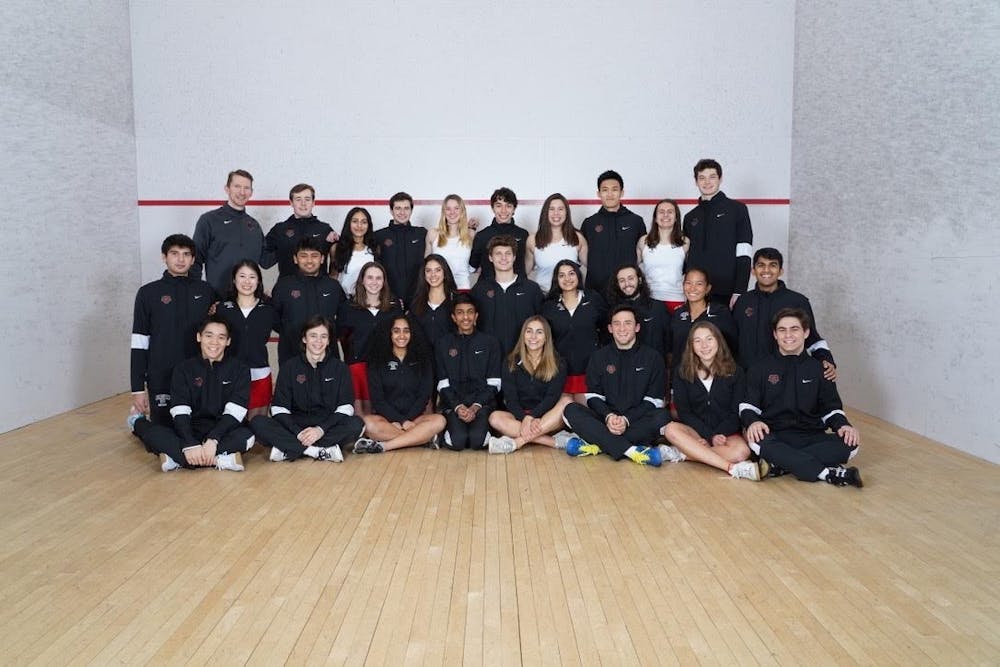In May 2020, members of the men’s and women’s squash teams joined a Zoom call hosted by the Athletics Department. During the meeting, they were informed that their sport had been demoted from varsity to club status, meaning they would no longer have access to the resources and recruiting mechanisms they once did. The teams were demoted as part of the Excellence in Brown Athletics Initiative, The Herald previously reported.
The transition left the future of Brown squash in a state of uncertainty, according to women’s squash captain Sara Syed ’22.
“I was instantly thinking, ‘What are we gonna do?’ ” recalled Syed. “ ‘How do we get (varsity status) back? What is this going to look like for us?’ ”
Almost two years later, a group of dedicated players led by a new head coach completed one of its most memorable seasons in recent years. The women’s and men’s teams finished ranked 11th and 21st in the country by the College Squash Association, respectively, while Brown received the most Scholar-Athlete Awards in squash of any college in the nation and took home its first-ever Intercollegiate Championship in mixed doubles.
It “would have been very easy to come back and just say, ‘Okay, we can’t do that, so therefore we won't. That's it,’ ” said Head Coach Arthur Gaskin of the team facing obstacles this season. “But (the athletes) found a solution. We as a group found a solution.”
“The thing that’s impressed me the most is just the dedication of all the members of the team now that we’re not varsity anymore,” Syed said. “It was really just self-motivated. And I think that was really inspiring and great to see that everyone was playing their hardest and training their hardest just because they truly wanted to be there.”
This self-motivation was key to the team’s success in a season where they couldn’t train the way they did as a varsity team, given their limited access to facilities, according to Gaskin and multiple athletes.
“In years previous, they would have had consistent access a couple of times a week to Zucconi (Strength and Conditioning Center) rooms to do extra strength training and fitness work, and this year, we didn’t have that,” Gaskin said. This season, the team has compensated with training programs at the Nelson Fitness Center, with athletes managing their own schedules, according to Gaskin.
“They were all super committed (and) they all really wanted to do the extra work so that they could compete. I think that was pretty awesome and a testament to them,” Gaskin added.
According to multiple players on the women’s team, a month before the end of the season, they were able to begin using the varsity weight room again at a given weekly time. The team also was no longer provided a trainer, which meant players had to be more proactive in preventing possible injuries. The team eventually paid out of their club budget for a trainer to come weekly, Syed said.
“Squash is a really physically demanding sport, and so we had to battle through injuries — going to the Nelson ourselves, being really self-motivated and practicing self-care,” said men’s captain Grant Sterman ’22.
Longtime head coach Stuart leGassick’s contract was terminated in September, according to multiple current squash players. As a result, the team practiced without the help of a coach for part of the fall. "While we are unable to comment on personnel matters, we remain grateful for Coach LeGassick's 31 years of dedication to Brown and the squash programs,” Jake Silverman, deputy director of athletics for administration, said in a statement provided to The Herald. “At the same time, we are thrilled with the direction of the programs under Coach Gaskin's leadership.”
During this period, the team captains assumed responsibility for organizing practices and coordinating matches with other schools.
“That was a really stressful time,” Sterman recalled. “But any amount of sacrifice that (captain) Declan (McCarthy ’22) and I had to make would have been worth it for what we get out of playing on the team every year. We just sat down and worked together to organize everybody and use our experience of over 10 years of playing squash to come up with practices, get everyone in line and set up meetings.”
“Setting up good, intense, competitive matches for us to play was a big challenge,” Syed said. “Then organizing the buses and the travel and hotels for us to stay at was a huge logistical” undertaking. According to Syed, some schools which the team was supposed to play didn’t “necessarily want to play a club team.”
Gaskin assumed the role of head coach in November. Players applauded Gaskin’s leadership and credited him with playing a major role in their improvement and eventual success.
“That he stood up out of the goodness of his heart to come help us and coach us just means the world to everyone on the team,” Sterman said. “I just feel like we couldn’t have accomplished nearly half of what we have this season without him.”
“What made Coach Gaskin such a great coach was that even though he really pushed us, he still allowed the players and the captains to have a level of freedom,” Syed said. “I think that makes everything feel more worthwhile and (makes us) more excited to come to practice.”
Other players also appreciated Gaskin’s coaching style. “He is most definitely the best squash coach that I have ever met and probably one of the best ones out there,” said Rachel Mashek ’24, emphasizing that Gaskin quickly fixed longtime struggles in her game.
“I think we all got so much better (technically) and improved our fitness dramatically,” Syed added. Our success “is because of him.”
Gaskin, meanwhile, directed praise towards the teams’ captains, whom he called “legends.” “How they rally the troops, how they rally each other, how they inspire the rest of the team to work hard — not just leading by example verbally but in how they act,” he said. “It’s quite inspirational to see and it definitely rubs off (on) the rest of the team.”
Gaskin also highlighted the importance of the captains while the teams had no coach.
Mashek similarly praised the captains for their efforts. “They were literally doing the job of a coach and more, because they were also doing administrative stuff,” she said. “I can definitely say I would not have shown up for practice every day if not for them.”
Some athletes were even more driven to succeed after the squash teams were demoted to club status, according to Mashek and Sterman.
“We wanted to show Brown and show the squash world that we’re still a really strong competitive team,” Mashek said. “We can still be really competitive and (be) even more competitive than (in) past seasons.”
“When we were cut, we were told that we weren’t a competitive team,” Sterman said, referencing the administrators’ consideration of competitiveness when selecting teams to demote. “So we did feel like we had something to prove, perhaps a chip on our shoulder, both in regards to Brown and also how other teams were looking at us. So we wanted to make sure that, varsity or club, we were at the top of our game and ready to prove ourselves to the world.”
One major impact of the demotion is that Brown will no longer be able to formally recruit athletes like Sterman to play for the team. While it will no longer have dedicated spots in admissions reserved for squash players, the squash program can participate in informal recruitment, which involves a “relationship” with the Office of Admission, The Herald previously reported.
This season also marked the final year Brown squash will be eligible to play in varsity-level national championships.
Though it may be their last time competing at that level, the team went out with a flourish: Mashek won the Intercollegiate Championship in mixed doubles with Blake Roshkoff ’24 and made the finals in the women’s doubles with Danielle Benstock ’23. Mashek and Roshkoff beat another Brown duo composed of Sterman and women’s squash team captain Isabella Kearns ’22.
Syed praised her teammates for their display of teamwork. “A big thing in doubles is how well you can communicate and work with your partner,” she said. “I feel like the fact that it was a ‘Brown finals’ just shows how well we know each other (and) know how to communicate.”
The championship capped off a season filled with memorable moments, including particularly emotional matches against Tufts University for both the men’s and women’s teams.
“Tufts was definitely a match that we really wanted to win and we targeted that match earlier in the season as one of our few opportunities against a team ranked higher than us,” Gaskin said. The men’s team had nine “great performances” and five wins in the Jan. 22 match, according to Gaskin.
“Even players that didn’t win still came through and performed excellently,” Gaskin said. “It was awesome.”
It was Sterman who came through with the contest on the line, winning his match with the teams tied at 4-4. It was “very emotional and it was just a huge victory for the whole team to know that we pulled out such a tight match at home in front of a good crowd,” Sterman said.
A standout moment for the women’s team came against Tufts in their final match of the team championships at the end of the season, when they rallied from a 4-0 deficit to win 5-4. Mashek, who lost her match, recalled the feeling of watching her teammates rally to pick her up and seal the win: “I just felt the moment when the tide started turning and everyone started to win their matches,” she said. “Everyone who went on after knew that they had to win their match, because if they lost their match (the team) would have lost.”
“Even though I personally had lost, I just had complete faith in my team, and I knew that everyone would pull their weight and make up for my loss,” she added.
The College Squash Association recently announced that Brown received the most Scholar-Athlete Awards of any college in the nation, which Syed considers an important achievement. “It has been a difficult couple of years and it has felt a little bit like we’re not being seen (even though) we’re putting in so much time and effort,” she said. “And so it is really nice to end up getting this recognition.”
Going forward, maintaining a sense of “family,” Mashek said, is something that the team hopes will remain central. “I got back at 10 p.m. from (nationals in) Philadelphia, and then right away I went to a team event and just hung out with the whole team,” she said. “I had an exhausting weekend emotionally and physically, but all I wanted to do was go and hang out with my teammates. It’s not just about playing squash with them — I'll be hanging out with them during the week, on weekends (and) doing work with them.”
“All four years of Brown, the moments where we were just studying in the (Sciences Library) or having fun on the bus on the road to a match — those are the things that I'm gonna really take with me,” Sterman said. “I hope (they) carry on (as) lifelong friendships, and I hope that they continue to grow after I graduate.”

Linus is a Sports editor from New York City. He is a junior concentrating in English, and when he's out of The Herald office you can find him rooting for the Mets, watching Star Wars or listening to The Beach Boys.





